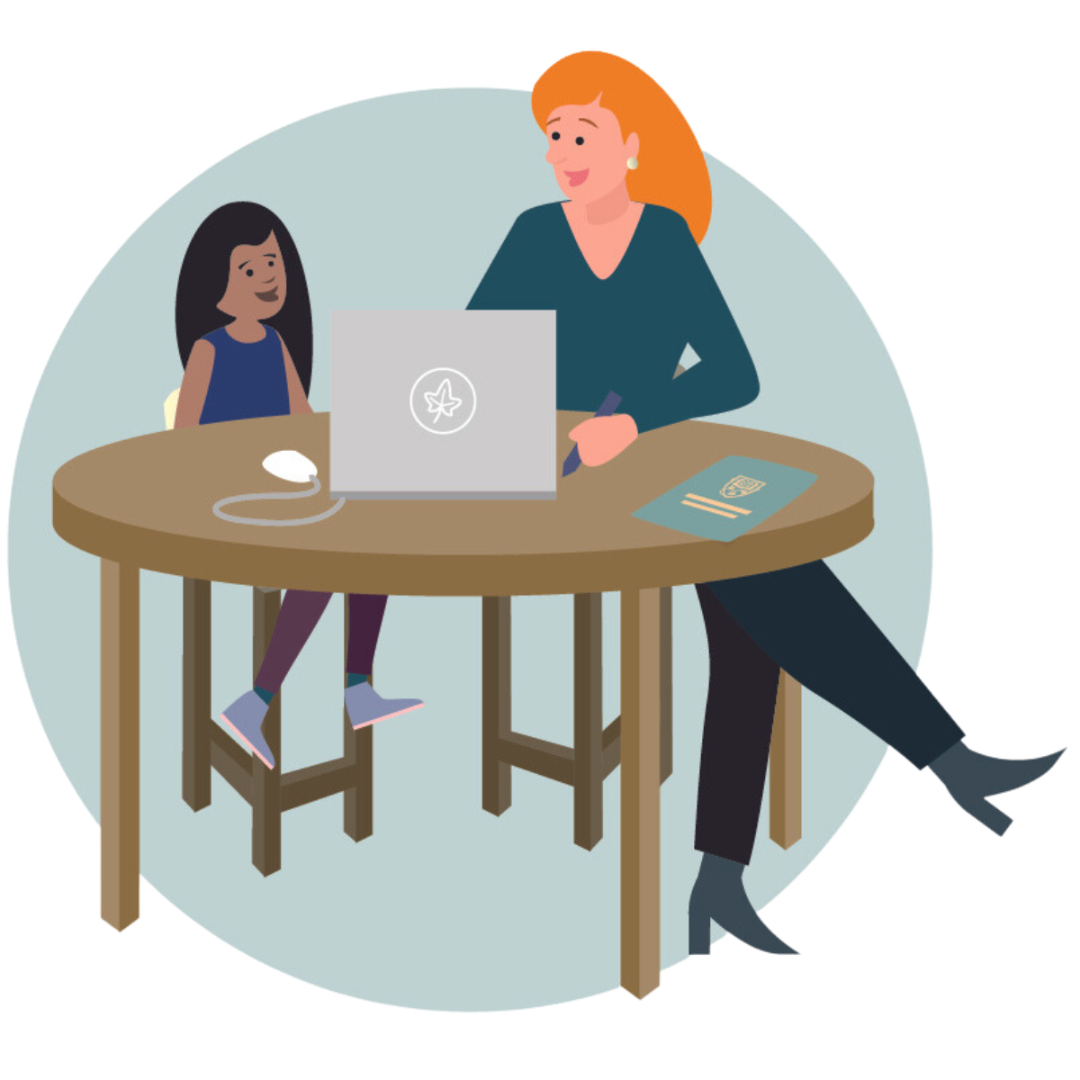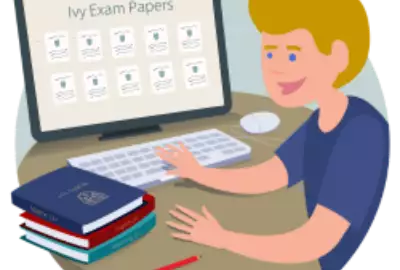Expert Insights
25 Frequently Asked School Interview Questions
Published 30th August 2024 by Alastair

An 11 Plus School Interview Guide: 25 of the Most Frequently Asked School Interview Questions
The 11 Plus interview is a critical step in the admissions process for many independent and grammar schools. This interview allows schools to assess a student's academic ability, personality, interests, and suitability for the school's ethos. For many students, this may be their first experience with a formal interview, so preparation is crucial in ensuring they feel confident and perform their best.
With help from our School Entrance Specialist, Brodie Bibby, this guide provides a thorough overview of what to expect and how to prepare and offers practical tips for answering the questions frequently encountered during the interview.
Will be hosting a FREE Webinar on the value of State versus Independent School Education on January 28th 2025. Click Here to sign up!
Read on...
Over the past few years, schools have placed a greater emphasis on interviews, making it essential for students to understand the significance of this step in the admissions process.
The 11 Plus interview typically lasts 20 to 30 minutes and is conducted by one or more members of the school's faculty, sometimes including the headteacher. It aims to assess a student's academic strengths, personal qualities, and how well they might fit into the school community. Here’s an outline of what typically happens before, during, and after the interview:
Before the Interview:
Schools often provide some guidance on what to expect. Students should arrive or log in early, dressed appropriately, and mentally prepared. The interview usually starts with a brief introduction, where the interviewer will greet the student and make them feel comfortable.
During the Interview:
The interview may begin with some simple, friendly questions to help the student relax. The core of the interview includes a mix of academic, personal, and general knowledge questions. The interviewer will assess not only the student’s answers but also their confidence, communication skills, and ability to think critically. Toward the end of the interview, students may be given the opportunity to ask questions about the school or discuss anything additional they wish to highlight.
After the Interview:
After the interview, students are encouraged to reflect on the experience, noting what went well and where they can improve. Some schools may provide feedback or follow-up, but this varies. It’s important to remain patient as the school completes its admissions process.

Each category is tests different aspects of a student’s abilities and personality. Understanding these categories will help students prepare more effectively.
Now, onto the main part! Below are 25 of the most frequently asked interview questions, broken down by category:
Question 1: "What is your favourite thing about your current school?"
Answer: "I really like the sense of community at my school. I've made loads of friends and my teachers are very nice and supportive..."
Question 9: "What do you like to do in your free time?"
Answer: I like to swim. I go swimming all the time at the pool down the road with my sister - there's a big water slide there and it's really fun. I also like playing games online with my friends. We're a small group that likes to play different games together, and I really enjoy messing around and having a good time with them".
Tip: When you answer this question, showcase something good that comes out of it. Don't just say "I like reading" or "I like to play games" explain why you enjoy the activities in your free time.
Question 10: "What is a hobby you are passionate about, and what do you enjoy most about it?"
Answer: "I love practising and playing the flute. Sometimes my mum gets annoyed if I play for too long, but it's very fun. I have lessons every week with my teacher, Sarah. She's a great teacher and she's really fun".
Tip: Share hobbies that reflect your personality and interests. Don't be afraid to expand on why you like to do what you do, and don't be afraid to give more than one example, but make sure you keep the question focussed.
Question 11: "What new skill or hobby would you like to learn and why?"
Answer: "I’d like to learn coding because it sounds really fun to be able to make something out of nothing. I noticed that you have a coding course. I might want to give it a go if I get to come to your school"
Tip: It's helpful for the interviewer to know that you have aspirations and long-term interests, and you are thinking about the future - not only at the school, but long-term growth. You should make sure that your answer takes this into account, and think about a skill or hobby that affirms this, whether it's a new instrument, sport, language, or an important life-skill, like cooking.
Question 12: "Can you describe a favourite school project or assignment you did this year, and why it was meaningful to you?"
Answer: "My favourite project was building a paper mache medieval castle for History. It was so much fun learning about the different parts of a castle, and building it really made me think about life in the medieval ages and it transported me into the past."
Tip: Choose a project that significantly impacted your learning or interests.
Question 13: What role do you enjoy playing in team sports or activities?"
Answer: "I like playing wing defence in Netball. I feel like my job is very important, and I like it when I make a good save, and stop the other team from scoring. I'm also quite tall so I'm very good at it!"
Tip: The interviewer is looking for the qualities you have as part of a team. This doesn't mean that you need to show that you are a team leader, but that you recognise the value and position you assume when you co-ordinate as part of a large group.
Question 14: "How do you balance schoolwork with extracurricular activities?"
Answer: "Sometimes it's difficult because I usually do quite a lot, but I always make sure I either do it as soon as I get home, or, if it's due the next week, I block out my Sunday mornings to finish everything off".
Tip: The interviewer wants to know that you are conscious of time-management. Ensure you explain how you manage your time effectively between different commitments.
Question 15: "What motivates you to pursue your interests and hobbies?"
Answer: "I really love learning new things and understanding how things work. If something catches my eye, I like to learn every little thing there is to know about something, and really get invested in it".
Tip: Answering this question well will give your interviewer an understanding of your self-awareness skills, and your ability to understand how much you know about yourself.
Question 16: "What’s a memorable experience you’ve had while participating in a club or team?"
Answer: "When our netball team won 5-1 against our rival school a few weeks ago. We lost to them last time we played a friendly with them, but this time I really held my own in defence and communicated well with our centre, and I remembered how they played and outsmarted them. I won player of the match!"
Tip: Share an experience that highlights your involvement and enjoyment, as well as showcasing how you operate in a team.
Question 17: "If you could create a new school rule, what would it be and why?"
Answer: "I would make it mandatory to take food-tech classes until you're 16. When we grow up and become adults, mum and dad won't be there to give us supper. We'll have to figure out what to eat 3 times a day! I think everyone should learn how to cook."
Tip: Propose a rule that could positively impact the school environment or student wellbeing. Be as creative as you like, but make sure that it is at least a little bit practical.
Question 18: "Imagine you are the headmaster of your old school for a day. What changes or activities would you implement?"
Answer: "I would propose more school trips! We only had one a year and they were always boring, we only ever went to a museum or to the zoo. I would like to have seen more plays, or gone on more historic outings, like a re-enactment, like being a Victorian Schoolchild for the day, or going to see a factory or office..."
Tip: Discuss practical changes or activities you would implement and why. Maybe focus on something you found imperfect at your old school, and what you would do to fix it.
Question 19: "Would you rather have a time machine or a teleporter?"
Answer: "That's easy, I would rather have a time machine. I would love to go back in time to learn how the ancient Greeks lived..."
Tip: Explain your decision, and what you would do with your new found power.
Question 20: "Say you were given that teleporter instead, but it could only work twice: One to take you somewhere, and once to take you back home. Where would you go, and why?"
Answer: "I would travel to Japan and visit historical sites like their temples. I also like anime and manga, so I would like to go visit the comic book stores there..."
Tip: Be creative and showcase what you would like to explore or see if you were given the opportunity to go wherever you wished.
Question 21: "Would you rather have a bath in jelly or baked beans?"
Answer: "I’d prefer a bath in jelly because it would be a fun, squishy experience compared to the messiness of baked beans. I also wouldn't want to smell of baked beans all day!"
Tip: This question might be silly, but it tests your creativity and ability to think on your feet.
Question 22: "If you were given a superpower based on your personality, what would it be?"
Answer: "My superpower would be to be able to touch an object and know how it got there. I am very curious, and I think that a superpower that teaches me about things in the past would suit me nicely"
Tip: Again, be creative, and really think about the question that's asked. Sometimes, you might be answering a question you think the interviewer asked, but they asked something else entirely. In this instance, the interviewer isn't asking you what your favourite superpower would be, they're asking you what superpower reflects your personality. Again, they are testing you to think on you feet and really know yourself.
Question 23: "What is one invention you think would greatly improve your daily life? How would it work?"
Answer: "I'd make a contraption that that automatically sorts recycling into the correct bins. It's one of my chores at home and I hate having to sort the recycling out!
Tip: Try to propose an innovative idea and explain its practical benefits, it will showcase the way you observe the world around you.
Question 24: "If you could teach any subject at school, what would it be and why?"
Answer: "History! It's one of my favourite subjects, and I would get to go on all of these fun trips to historic places around England. That would be really fun. I would also like to inspire people to enjoy History as much as I do."
Tip: Explain what you value about a particular subject, and how its importance can inspire others to enjoy it as well.
Question 25: "If you could add any subject to the school curriculum, what would it be?"
Answer: "Life skills. I would have some sort of subject that teaches you how to do the washing, sew a button onto a shirt, change a lightbulb, and other things that adults to every day. It's all well and good learning how to do maths, but these are really useful things they don't teach you at school!"
Tip: Again, this is another chance to be creative. Choose a topic you think people should learn, but don't have the opportunity to, like a type of sport, or something subject-adjacent, or splitting a subject into two, like geography and geology, or earth-science. Explain the benefits of doing this.
Building Confidence
Our school entrance specialists emphasise the importance of building confidence in students. They suggest that parents and educators should encourage children to express their opinions and engage in discussions without fear of being wrong. Confidence comes from knowing that it’s okay to make mistakes and learn from them.
Creating a Quiet Space
In today’s environment, where online interviews are becoming more common, it’s crucial to create a quiet, distraction-free space for the interview. As Brodie mentions, background noise like barking dogs or sibling squabbles can disrupt the interview and affect a Mock Interviews
Mock Interviews
Conducting mock interviews with a parent, teacher, or tutor is one of the most effective ways to prepare. These practice sessions help students get used to the format of the interview, reduce anxiety, and receive constructive feedback on their performance.
Ivy Education offers School Entrance Mock Interviews led by former headmasters of top independent schools. If you would like support in preparing to some of the most competitive 11+ Schools in the country, Ivy Education are here to help.
This webinar offers an insightful and dynamic look into a significant part of the senior school admissions process: the interview.
Brodie will talk about the importance of instilling self-belief and providing the foundations for performing with confidence at interview by focusing on the following:
• The significance of the interview
• How to support your child with interviews
• Preparation for different interview scenarios
• Practical tips to help the whole family
• Dealing with anxiety of the interview
The webinar lasts 30 minutes and will contain a vast array of tips and suggestions on how to help your child. The last 10 minutes of the Livestream consists of a Q&A section with questions from parents who attended the session.
After a career spanning thirty years as a teacher and school leader both in the private and state systems, Brodie left Headship in December 2018 to develop a supplementary curriculum to that taught in schools, focusing on interviews and softer skills children need to thrive both at school and beyond.
As Deputy Head of Westminster Under School and Head of North Bridge House Prep in Regent’s Park and recently Head of Wetherby-Pembridge in New York Brodie, developed has huge network of contacts in the prep and senior schools’ world and he continues to work closely as a consultant with a wide range of nursery, prep and senior schools in London and throughout the UK.
Brodie estimates that he has successfully placed over a thousand children into schools across London and the entire country during his time in school leadership. A major component of his new role is offering one-to-one interview strategies and running workshops for small groups of children based around drama, philosophy, debating and problem solving.
As the father of two children at university, a girl and a boy, Brodie understands the educational system from the perspective of a parent as well as a Headteacher.
Enter your email and name into the form below to receive a link to a replay of this webinar.
The 11 Plus interview is an opportunity for students to showcase their academic abilities, personal qualities, and enthusiasm for learning. By understanding the types of questions that might be asked and preparing thoroughly, students can approach the interview with confidence.
Remember, the interview is not just about answering questions well; it’s also about demonstrating your interest in the school, your willingness to learn, and your ability to think critically and communicate effectively. With careful preparation and a positive mindset, you can make a strong impression and increase your chances of success in the 11 Plus admissions process.
Good luck!
The 11 Plus interview typically lasts between 20 to 30 minutes.
The interview is usually conducted by one or more members of the school’s faculty, often including the headteacher.
Encourage your child to think creatively and practice answering a variety of questions, including hypothetical or “Would you rather?” questions. The goal is to build their confidence in thinking on their feet.
No, memorisation can make answers sound rehearsed and unnatural. Instead, focus on helping your child understand how to approach different types of questions and think critically.
Use mock interviews to simulate the real experience as closely as possible. Provide feedback on both the content of your child’s answers and their delivery, such as tone of voice and body language.
Your child should wear neat, clean, and comfortable clothes. If the interview is online, ensure that they are dressed appropriately and that the background is tidy.
The importance of the interview varies by school, but it is generally a significant factor in admissions decisions. Schools use the interview to assess a child’s fit for their community and their potential to thrive.
It’s normal to feel nervous. Encourage your child to take deep breaths and remind them that it’s okay to take a moment to think before answering questions.
Yes, encourage your child to stay informed about current events by watching the news, reading newspapers, or discussing recent events at home.
If your child doesn’t know the answer, they should stay calm, think it through, and do their best to answer. It’s okay to admit they don’t know but to express interest in learning more.
We offer school entry mock interviews to help your child better prepare for the day. Click here to learn more!
School Entry Mock Interviews












